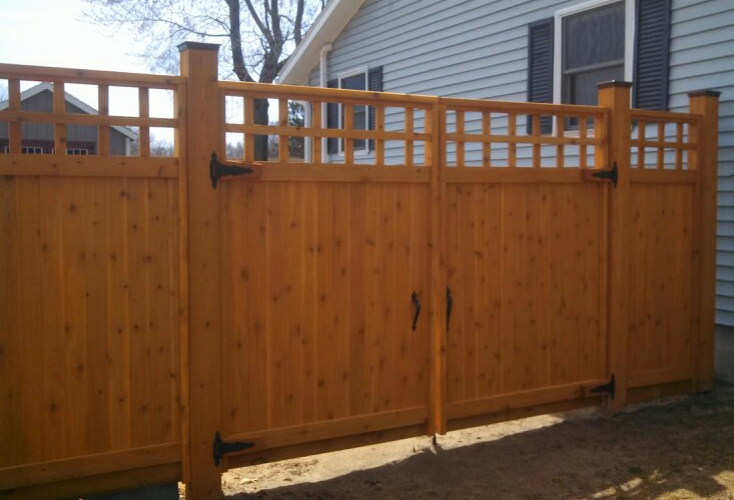All Categories
Featured
If you're taking into consideration mounting a fencing around your building, understanding the permit requirements in your location is important. In this guide, we'll damage down the different authorizations you may require to install a fence and exactly how to guarantee your project stays compliant with regional regulations.
Why Are Allows Required for Fencing Installment? Licenses are called for to make sure that the fence you develop adheres to local building codes, zoning policies, and safety requirements. They make certain that the fencing won't block utilities, web traffic flow, or develop risks for pedestrians.
![]()
Kinds Of Permits You Might Requirement. Structure Permit. A structure authorization is the most usual demand for setting up a fencing. This permit makes sure that the structure you construct complies with local safety and security codes and laws. If your fencing surpasses a specific height (usually around 6 feet), you may require to acquire a building permit. The regional authorities will typically evaluate your strategies to make certain that your fencing is secure and structurally audio.
Zoning Permit. Zoning regulations regulate land usage in your location, and they typically control where fencings can be mounted, along with just how high they can be. A zoning license makes certain that your fence adheres to these policies. For instance, your fencing could require to be set back a specific distance from sidewalks or home lines. Zoning guidelines can vary by community, so it's critical to check the details policies that relate to your place.
Homeowners Association (HOA) Approval. You may need approval prior to setting up a fence if your property is part of a homeowners organization. HOAs typically have strict policies regarding the type, style, and products used for fencings to keep an uniform appearance throughout the neighborhood. The HOA may need you to submit in-depth strategies or demand authorization before installment. Make certain you comply with these standards to avoid potential fines or fines.
Specialized Permits. Sometimes, you might need specialized allows based upon the area of your property or the nature of your fencing. As an example, if your residential or commercial property is in a flood area, you might require extra licenses to make sure that your fence does not block drainage or water flow. In a similar way, if you intend to build a fence near an ecologically protected location, you might require a special permit to follow ecological guidelines.
![]()
Energy Easements and Energy Firm Approvals. Some homes have utility easements, which are areas assigned for utility cable televisions, pipelines, or lines. Before setting up a fence, you should examine if your home has an easement. Developing a fencing within an easement could disrupt energy maintenance or damages underground lines. You may need approval from the energy firm or local authorities before waging the installment.
Exactly How to Identify Which Allows You Need. Contact Neighborhood Authorities. The very first action in figuring out the authorizations called for is to contact your regional structure division or zoning workplace. They can offer particular information concerning what authorizations are required for your location. Many cities have on the internet resources or sites where you can inspect the demands or even make an application for a license online.
Seek Advice From an Expert Fencing Professional. A regional fence service provider is commonly knowledgeable about the authorization procedure and regional regulations. They can assist you browse the demands and make certain that your task is compliant. Many service providers also handle the authorization application procedure on your behalf, conserving you effort and time.
Review Your Area's HOA Guidelines. Make certain to examine their standards prior to using for any type of authorizations if you live in an area regulated by an HOA. The HOA might require particular styles, products, or elevation limitations for fencings within the neighborhood. Submit your plans to them for approval prior to proceeding.
![]()
Effects of Not Acquiring a License. Setting up a fencing without the required authorizations can lead to major consequences. Prospective customers may wait to buy a building with an unpermitted fence, especially if it's in infraction of zoning laws.
Final thought. Prior to installing a fencing on your residential property, see to it you understand the local policies and get any needed permits. Structure authorizations, zoning authorizations, HOA approvals, and specialty allows all play a crucial duty in making sure that your fence is secure, legal, and compliant. Putting in the time to study and protect the proper permits will save you from expensive mistakes and potential legal issues in the future. Whether you're preparing a privacy fencing or an attractive limit, adhering to these steps will help make the setup procedure smooth and hassle-free.
Why Are Allows Required for Fencing Installment? Licenses are called for to make sure that the fence you develop adheres to local building codes, zoning policies, and safety requirements. They make certain that the fencing won't block utilities, web traffic flow, or develop risks for pedestrians.

Kinds Of Permits You Might Requirement. Structure Permit. A structure authorization is the most usual demand for setting up a fencing. This permit makes sure that the structure you construct complies with local safety and security codes and laws. If your fencing surpasses a specific height (usually around 6 feet), you may require to acquire a building permit. The regional authorities will typically evaluate your strategies to make certain that your fencing is secure and structurally audio.
Zoning Permit. Zoning regulations regulate land usage in your location, and they typically control where fencings can be mounted, along with just how high they can be. A zoning license makes certain that your fence adheres to these policies. For instance, your fencing could require to be set back a specific distance from sidewalks or home lines. Zoning guidelines can vary by community, so it's critical to check the details policies that relate to your place.
Homeowners Association (HOA) Approval. You may need approval prior to setting up a fence if your property is part of a homeowners organization. HOAs typically have strict policies regarding the type, style, and products used for fencings to keep an uniform appearance throughout the neighborhood. The HOA may need you to submit in-depth strategies or demand authorization before installment. Make certain you comply with these standards to avoid potential fines or fines.
Specialized Permits. Sometimes, you might need specialized allows based upon the area of your property or the nature of your fencing. As an example, if your residential or commercial property is in a flood area, you might require extra licenses to make sure that your fence does not block drainage or water flow. In a similar way, if you intend to build a fence near an ecologically protected location, you might require a special permit to follow ecological guidelines.

Energy Easements and Energy Firm Approvals. Some homes have utility easements, which are areas assigned for utility cable televisions, pipelines, or lines. Before setting up a fence, you should examine if your home has an easement. Developing a fencing within an easement could disrupt energy maintenance or damages underground lines. You may need approval from the energy firm or local authorities before waging the installment.
Exactly How to Identify Which Allows You Need. Contact Neighborhood Authorities. The very first action in figuring out the authorizations called for is to contact your regional structure division or zoning workplace. They can offer particular information concerning what authorizations are required for your location. Many cities have on the internet resources or sites where you can inspect the demands or even make an application for a license online.
Seek Advice From an Expert Fencing Professional. A regional fence service provider is commonly knowledgeable about the authorization procedure and regional regulations. They can assist you browse the demands and make certain that your task is compliant. Many service providers also handle the authorization application procedure on your behalf, conserving you effort and time.
Review Your Area's HOA Guidelines. Make certain to examine their standards prior to using for any type of authorizations if you live in an area regulated by an HOA. The HOA might require particular styles, products, or elevation limitations for fencings within the neighborhood. Submit your plans to them for approval prior to proceeding.

Effects of Not Acquiring a License. Setting up a fencing without the required authorizations can lead to major consequences. Prospective customers may wait to buy a building with an unpermitted fence, especially if it's in infraction of zoning laws.
Final thought. Prior to installing a fencing on your residential property, see to it you understand the local policies and get any needed permits. Structure authorizations, zoning authorizations, HOA approvals, and specialty allows all play a crucial duty in making sure that your fence is secure, legal, and compliant. Putting in the time to study and protect the proper permits will save you from expensive mistakes and potential legal issues in the future. Whether you're preparing a privacy fencing or an attractive limit, adhering to these steps will help make the setup procedure smooth and hassle-free.
Latest Posts
Living Area Furnishings Styles
Published Jan 19, 25
0 min read
Transform Your Bathroom with Bath Fitter
Published Jan 19, 25
0 min read
Montclare's Affordable Maintenance Options
Published Jan 19, 25
1 min read